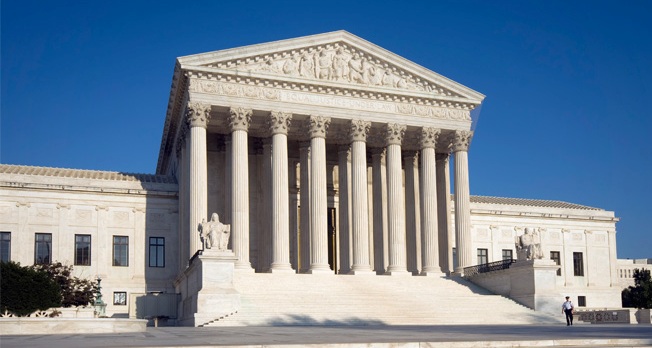Never miss a deal: Follow us on the DansDeals App, WhatsApp, X, Telegram, Instagram, Facebook, SMS, or our Daily Email Digest.
Links may pay us a commission. We appreciate your support! View our advertiser and editorial disclosure here. The content on this page is accurate as of the posting date; however, some of the offers mentioned may have expired.
It’s not often that you’ll see Ruth Bader Ginsburg and Clarence Thomas on the same side of a 5-4 decision, but that’s exactly what happened today in South Dakota v. Wayfair.
Back in 1992, the court ruled that states could only force a retailer to collect sales tax if they have a “nexus”, or physical presence, in the state.
Of course in the 26 years since that decision the internet changed the way business is done.
South Dakota passed a law that required businesses that had more than 200 orders or $100,000 in sales to South Dakota residents to collect and remit sales tax. They sued Wayfair, Overstock, and Newegg for failing to do so.
The lower courts all ruled against South Dakota as the 1992 case precedent required a nexus in the state.
Today’s ruling tosses that out the window. A nexus no longer requires a physical presence in the state. The court ruled that the fact that the companies are large and do a substantial amount of business in the state is enough to create a nexus.
The court specially cited that it liked the fact that the South Dakota law exempts companies without significant sales in the state from collecting sales tax and that it doesn’t try to collect sales taxes retroactively. It also appreciated that it has a single state level sales tax administration that provides free sales tax software to companies and exempts them from audit liability if they use the software.
Justice Thomas concurred with the majority opinion and expressed regret for not voting differently back in the 1992 case.
The minority opinion wanted to uphold precedent and to wait for Congress to act, not for the Supreme Court to act for them.
At any rate, I’d expect more states to try to quickly emulate South Dakota’s law. That will mean most large online retailers will have to collect sales tax for deliveries to all states with such a law. We’ll have to wait and see what this change will do for 3rd party sellers on Amazon.com, as Amazon currently doesn’t make them collect sales tax in most states.
Should Congress fail to pass a national law, I think that it’s very likely that some states will overreach by taxing companies with a smaller number of sales or by having overly complicated sales tax burdens and that this will wind up back in the Supreme Court yet again.



![[Lawyer From Previous Lufthansa Antisemitic Incident Will Represent Passengers From This Week’s Incident] Deja-Vu: Lufthansa Accused Of Antisemitism Again](https://i.dansdeals.com/wp-content/uploads/2019/01/24205620/lh-373x150.jpg)

![[Cancellation Updates, Arkia Adds Athens Connection] Here Are The Current And Next Available Flights To Israel On More Than 40 Airlines!](https://i.dansdeals.com/wp-content/uploads/2020/08/16160333/dansdeals-glitch-fare-1024x538-1-286x150.jpg)













![[AMEX Explains Upcoming Points Transfer Pause To Emirates] Ultimate Guide To Bank Points Transfers; Including All Current Bonuses And Transfer Times!](https://i.dansdeals.com/wp-content/uploads/2020/08/16160333/dansdeals-glitch-fare-1024x538-1-133x70.jpg)




Leave a Reply
36 Comments On "Supreme Court Votes 5-4 To Overturn Precedent: States Can Now Enforce Out Of State Online Sales Tax Collection"
All opinions expressed below are user generated and the opinions aren’t provided, reviewed or endorsed by any advertiser or DansDeals.
What does the state government provide that justifies collecting this tax, unless they earmark all funds for road repair and construction? (There’s no way they will.)
They provide airports for the planes to land and roads for the trucks to deliver the items. Police and EMT services for the car accidents that the trucks are in or cause.
Wrong. That is already being paid for in the shipping and handling fees paid to the local companies.
It may hurt the comsumer, but face reality. It’s the most logical thing. We’re at a point where most of a state’s sales happen online, and yet only B&M stores are charging sales tax. These stores are the ones that are bringing in money and jobs to the local economy, and yet it’s as if we are penalizing them for it by making only them charge sales tax.
Or have the online retailers pay sales tax, on all sales, to the state where there business is headquartered. And if your answer will be that they will then only locate themselves in states with no sales tax, then I’ll say that that’s too bad for the other states, they should learn how to run a government without a regressive sales tax.
Lobby your state government not to Levy taxes in e-commerce sites.
“We’re at a point where most of a state’s sales happen online”
Huh? What state do you line in?
Depends on the shopping category
https://www.statista.com/statistics/311459/us-online-in-person-shopping-preferences-product-category/
That’s shopping preferences. Why not just say you were wrong? In fact, E-commerce sales in the first quarter of 2018 accounted for 9.3 percent of total sales. That’s from the US Dept of Commerce, not from “Look Mommy, I found it on Google.”
That’s because cars are purchased at local dealerships, a lease is considered a purchase as well, so $$ amounts it seems like only 10% of the $’s spent are online when you count retail spending (May also include housing too, but not sure about that), however in reality you need to take those numbers out and focus solely on the relevant retail categories.
The sales tax in itself is not always going to cover help “jobs and economy”. Once the government entered the tax into the law, they’ll try to enforce it on anything they can, even though it doesn’t make sense.
When congress is slower than a La Guarida runway. Businesses/states have to kick the can to the 9 un-elected justices to decide for over 300 million people. Sad!
All the court is doing is saying there’s nothing illegal about states making such a law.
State of our “democracy”
Love the Trumpian “Sad!”
Amazon already charges and collect sales tax in PA and WA.
And about 43 out of the other 48 states. Of the 5 remaining states, 4 have no sales tax.
So basically, you meant to say that Amazon collects sales tax on items it sells in 98% of the states that charge sales tax.
This makes a lot of sense and frankly, is long overdue. With so many e commerce only companies, it’s hard to argue the exemption is logical.
Of course the chinese importers on Amazon won’t have to collect! Just another advantage of being Chinese.
‘Cept for them tariffs that are comin round…
If the seller is in the US and the buyer is abroad, no reason the merchant’s state can’t collect the tax.
Just waiting for someone to scream a random MAGA and you’ll make my day
James u just did!!! Haha
#MAGA
Thank you!! Now I can shut my Amazon store and still be high on American Greatness
As much as I hate taxes This is the correct decision.
You nailed it, Dan. There is considerable hand-wringing on the Amazon seller message board, from penny-ante sellers who overlook the $100,000 in sales or 200 transactions requirement. What they should really be concerned about is the proposal to reorganize the Postal Service, mostly in a way to tax Jeff Bezos. But I doubt there will be Congressional action either on Internet sales tax, or postal plans.
I work for a Big 4 accounting firm and you beat them to the punch in announcing this by over an hour. Impressive @Dan.
Ok, I’m a small manufacturer in CA that sells around $20,000 on line annually, but close to 7 figures via phone orders. I already pay about $1000 a year for sales tax software for California only from the #1 company in the country – the only one that works with our accounting package (free software won’t help most companies). The national software will cost me close to 10 grand/yr. 1 in costs with installation and troubleshooting.
Will this stop with on line sales only?
No, All mail order if you meet the requirements.
It goes without saying that government jobs are known to be the easiest and often the most abused now we have to pay even more money towards governments miss use of funds it’s depressing and upsetting and if I knew that this money would be going somewhere I believed I would except this rule happily and not say a word but since we know this money will be used to make the fat cat fatter and the little guy will still be left with out what they need like schools
I agree. A better use of our taxes is to subsidize punctuation, so that more people will use it when they comment on blogger sites, like #DansDeals.
will this work in reverse also? like will a company in NY that ships to Maine need to collect NY sales tax because part of the transaction happened is NY?
if so, it is the end commerce being based out of NY because of sales tax as high as 9.875% in NYC. if not, will they try and see if SCOTUS will give them the same ruling for this?
Amazon has been pushing for this in Congress. It already has to collect tax on most sales and that hurts it against other online companies.
If Congress set a nationwide sales tax level (say 5%) it would create pressure on states to have their sales tax be no higher than that. I personally would much prefer sellers to collect sales tax, since my state (Illinois) otherwise requires me under penalty of perjury to go back and calculate missing sales taxes for all online sales for the year, or to use their “estimated” tax which will now overcount what is due. I don’t like to lie or cheat, even if it’s unlikely they’d enforce anything against me. I support laws which are self-enforcing, like when sellers collect tax. Or maybe I should say, the worst kind of laws are the ones that reward liars.
Sorry so late to the discussion.
Regarding how Amazon will handle 3rd Party vendors: past history is an indicator.
Years back, when the IRS began requiring seller platforms (like Amazon, eBay, etc.) to collect the tax information of their 3rd Party vendors and create 1099s for vendors that sold over a certain threshold (based on number of sales or total value of sales), Amazon applied a much much lower threshold. Basically, virtually all 3rd Party vendors, regardless of amount of sales or total value of sales, are required to provide their tax info to Amazon, and Amazon processes 1099s on virtually all 3rd Party vendors, even those that don’t technically meet the official IRS standard.
So, my guess is, when the time comes, all purchases from Amazon 3rd Party vendors will be assessed the appropriate sales tax, if any (Amazon will handle the technical details, obviously).
This will prove to be a big blow to these vendors, as many currently receive a large percentage of orders based on the simple fact that sales tax will NOT be collected on those orders.